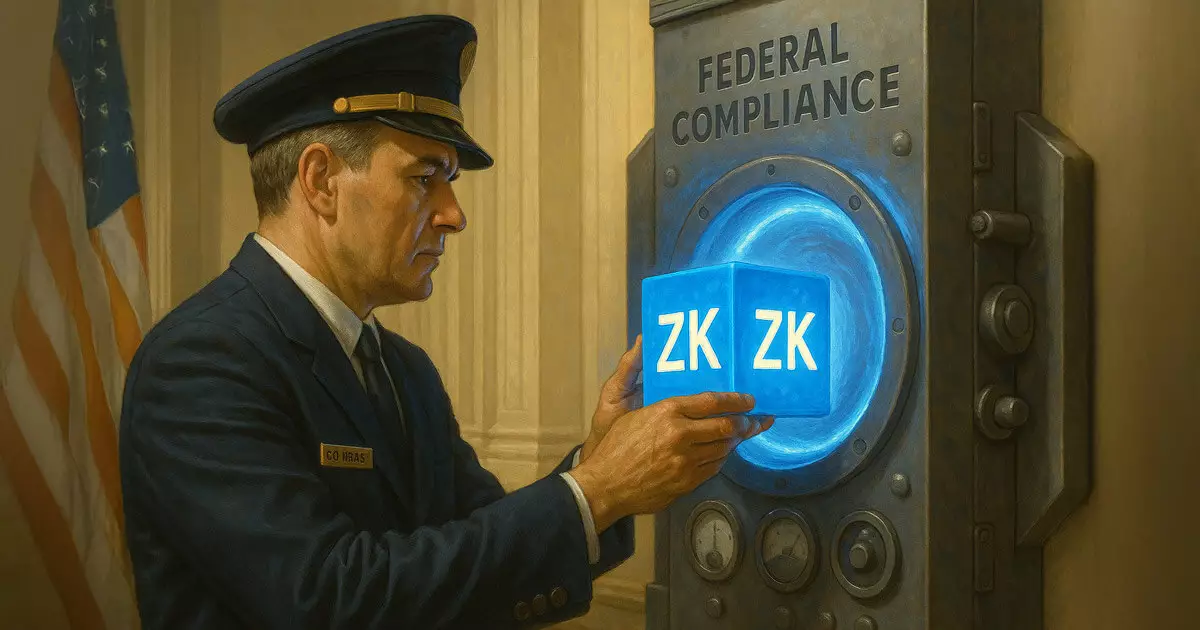In a landscape marred by increasing regulatory scrutiny, Coinbase’s recent call to overhaul the archaic Bank Secrecy Act (BSA) reveals a strategic attempt to blend innovation with compliance. By advocating for the integration of Zero-Knowledge Proofs (ZKPs) into the financial regulatory framework, Coinbase positions itself as a frontrunner in the delicate balancing act between transparency and privacy. While the foundation of this proposal is rooted in technological advancement, it unmistakably reflects a subtle push towards deregulation, or at least a smarter form of it that aligns with the crypto industry’s interests.
Grewal’s advocacy hinges on ZKPs’ ability to provide verifiable proof without divulging sensitive data. To imagine a future where an individual can open a bank or crypto account without surrendering decades of personal information is compelling—at least on paper. This approach promises to shield consumers from rampant data breaches and curb the abuse of personal data, a critical concern in an era dominated by cyberattacks and privacy violations. However, beneath this noble façade lurks a more pragmatic, less altruistic objective: reducing compliance costs and minimizing intrusive oversight while maintaining a veneer of regulatory legitimacy.
The Reality Behind Privacy Claims and Security Risks
Grewal’s articulation of the current Know-Your-Customer (KYC) process as a security vulnerability warrants scrutiny. Large, centralized databases have become golden geese for hackers, risking millions of citizens’ personal data every time a breach occurs. Yet, the narrative that KYC is ineffective—”frequently going unused”—can also be spun to serve regulatory and corporate interests, as it conveniently absolves institutions of the scrutiny they deserve. The more sanitized the perceived problems are, the easier it becomes to argue for less oversight under the guise of technological elegance.
The proposal that law enforcement could subpoena data stored as ZKPs introduces a complexity that is often glossed over. While ZKPs theoretically allow compliance without exposing detailed data, the reality is that such systems are not yet foolproof or widely tested under scrutiny. Entrusting sensitive data to a new, untested protocol merely shifts the risk from one point of failure (centralized databases) to a distributed, albeit cryptographically secure, system that could harbor unforeseen vulnerabilities. It is naive to assume that criminals or malicious actors won’t find ways to exploit these new tools, especially when the primary aim appears to be streamlining regulatory oversight rather than safeguarding consumer privacy.
Market Dynamics and Industry Ambitions
Coinbase’s strategic positioning amid a turbulent stock market reflects its broader ambitions beyond mere compliance. Market analysts see recent stock declines as opportunities for institutional investors willing to look past short-term fluctuations. Coinbase’s agreements with firms like Circle to foster USDC adoption and its investments in a “super app” that merges trading, payments, DeFi, and NFTs reveal a clear vision: to dominate the integrated financial ecosystem of the future.
This diversification might mask underlying vulnerabilities—over-expansion, regulatory delays, or growing competition—that could threaten its long-term sustainability. Still, Coinbase’s push into decentralized exchanges and broader token trading indicates where the industry is headed: an aggregation of services that reduces reliance on traditional banks while enticing retail and institutional clients alike. This makes the company’s future growth promising, but also highlights the risks of consolidating too much power in a single player at the intersection of technology, finance, and regulation.
Balancing Innovation with Ideological Critique
While Coinbase and similar industry players paint a picture of innovation-driven progress, the reality is often more ambiguous. The adoption of ZKPs and similar technologies signals a shift toward a less transparent, more privatized finance—one potentially susceptible to abuse if safeguards are not diligently maintained. As a center-right liberal, I am wary of unchecked technological leashes that favor corporate interests under the guise of efficiency and privacy. Striking the right balance between fostering innovation and maintaining sufficient oversight remains an open challenge.
The push for ZKPs could be revolutionary or a veiled attempt at deregulation disguised as progress. It has the potential to elevate consumer rights if implemented wisely, but equally threatens to create new loopholes that could be exploited by bad actors or used to obscure illicit activities. As governments and corporations negotiate this frontier, their true intentions often get clouded by the rhetoric of privacy and security, making skepticism a necessary attitude.
Without question, Coinbase’s advocacy highlights a pivotal moment in financial regulation—one that could define the future of privacy, security, and compliance in a digital economy. Whether this technological leap will genuinely serve the interests of ordinary users or merely benefit powerful financial entities remains to be seen. What is clear, however, is that the landscape of financial oversight is on the cusp of radical change, and the implications will echo through the fabric of society for years to come.

